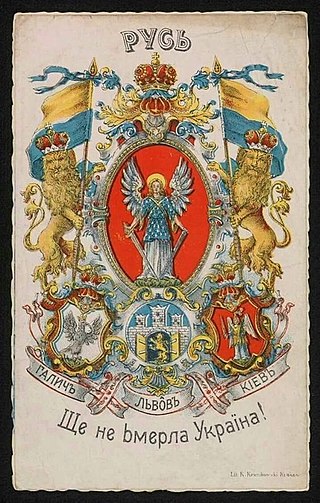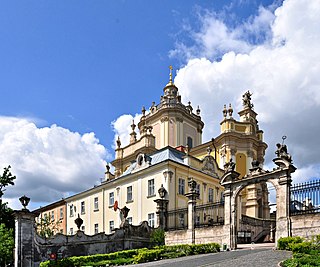Ruthenian Orthodox Church may refer to:

Ruthenia is an exonym, originally used in Medieval Latin as one of several terms for Kievan Rus', the Kingdom of Galicia-Volhynia and, after their collapse, for East Slavic and Eastern Orthodox regions of the Grand Duchy of Lithuania and the Kingdom of Poland, corresponding to what is now Ukraine and Belarus.

Ruthenian and Ruthene are exonyms of Latin origin, formerly used in Eastern and Central Europe as common ethnonyms for East Slavs, particularly during the late medieval and early modern periods. The Latin term Rutheni was used in medieval sources to describe all Eastern Slavs of the Grand Duchy of Lithuania, as an exonym for people of the former Kievan Rus', thus including ancestors of the modern Russians, Ukrainians, Belarusians, and Rusyns. The use of Ruthenian and related exonyms continued through the early modern period, developing several distinctive meanings, both in terms of their regional scopes and additional religious connotations.

The history of Christianity in Ukraine dates back to the earliest centuries of the history of Christianity, to the Apostolic Age, with mission trips along the Black Sea and a legend of Saint Andrew even ascending the hills of Kyiv. The first Christian community on territory of modern Ukraine is documented as early as the 9th century with establishment of the Metropolitanate of Gothia centered in Crimean peninsula. However, on territory of the Old Rus in Kyiv it became the dominant religion since its official acceptance in 989 by Vladimir the Great, who brought it from Byzantine Crimea and installed it as the state religion of medieval Kyivan Rus (Ruthenia), with the metropolitan see in Kyiv.
Ruthenian or Ruthene may refer to:

The Ukrainian Greek Catholic Church is an Eastern Catholic particular church that is in full communion with the Holy See and the rest of the Catholic Church. It is the second-largest particular church in the Catholic Church, second only to the Latin Church. As a major archiepiscopal church, it is governed by a Major Archbishop; the incumbent is Sviatoslav Shevchuk.
The Union of Brest was the 1595–96 decision of the Ruthenian Orthodox Church eparchies (dioceses) in the Polish–Lithuanian Commonwealth to break relations with the Eastern Orthodox Church and to enter into communion with, and place itself under the authority of the Pope of Rome. The Eparchy of Mukachevo that was located in the Kingdom of Hungary was left out of the process. The union established the Ruthenian Uniate Church, which currently exists as the Ukrainian Greek Catholic Church, and the Belarusian Greek Catholic Church.

Rusyns, also known as Carpatho-Rusyns, or Rusnaks, are an East Slavic ethnic group from the Eastern Carpathians in Central Europe. They speak Rusyn, an East Slavic language variety, treated variously as either a distinct language or a dialect of the Ukrainian language. As traditional adherents of Eastern Christianity, the majority of Rusyns are Eastern Catholics, though a minority of Rusyns still practice Eastern Orthodoxy. Rusyns primarily self-identify as a distinct Slavic people and they are recognized as such in Croatia, Hungary, Poland, Romania, Serbia, and Slovakia, where they have official minority status. Alternatively, some identify more closely with their country of residence, while others are a branch of the Ukrainian people.

The Ruthenian Greek Catholic Church, also known in the United States simply as the Byzantine Catholic Church, is an Eastern Catholic church that uses the Byzantine Rite for its liturgies, laws, and cultural identity. It is one of the 23 sui juris Eastern Catholic churches that are in full communion with the Holy See and the rest of the Catholic Church. There are significant, culturally distinct communities in the United States, Canada, and Europe. In the United States, the Byzantine Catholic Metropolitan Church of Pittsburgh is self-governing. In Europe, Ruthenian jurisdictions are exempt, i.e. dependent directly on the Holy See. The European branch has an eparchy in Ukraine and another in the Czech Republic.

The Catholic Church in Ukraine is part of the worldwide Catholic Church, under the spiritual leadership of the Pope in Rome.
Religion in Ukraine is diverse, with a majority of the population adhering to Christianity. A 2018 survey conducted by the Razumkov Centre found that 71.7% of the population declared themselves believers. About 67.3% of the population declared adherence to one of the Eastern Orthodox Churches, 7.7% Christian with no declared denominational affiliation, 9.4% Ukrainian Byzantine Rite Catholics, 2.2% Protestants and 0.8% Latin Rite Catholics, 1-2% Islam, Judaism was 0.4%; while a small percentage follow Hinduism, Buddhism and Paganism (Rodnovery). A further 11.0% declared themselves non-religious or unaffiliated. According to the surveys conducted by Razumkov in the 2000s and early 2010s, such proportions have remained relatively constant throughout the last decade, while the proportion of believers overall has decreased from 76% in 2014 to 70% in 2016 and 72% in 2018.

The Order of Saint Basil the Great, also known as the Basilian Order of Saint Josaphat, is a Greek Catholic monastic order of pontifical right that works actively among Ukrainian Catholics and other Greek-Catholic churches in central and Eastern Europe. The order received approbation on August 20, 1631, and is based at the Monastery of the Holy Trinity, Vilnius.
Ruthenian nobility refers to the nobility of Kyivan Rus and Galicia–Volhynia, which found itself in the Grand Duchy of Lithuania, Polish–Lithuanian Commonwealth and later Russian and Austrian Empires, and became increasingly polonized and later russified, while retaining a separate, cultural identity.

Michael Rohoza was the Metropolitan of Kiev, Galicia and all Rus' in the Patriarchate of Constantinople of the Eastern Orthodox Church from 1588 to 1596. In 1595, he signed the Union of Brest which moved the metropolis from the jurisdiction of the Patriarchate of Constantinople to the jurisdiction of the Holy See. By this act, the Ruthenian Uniate Church was formed in the territory of the Polish–Lithuanian Commonwealth. From 1596 until his death in 1599, he held the title of "Metropolitan of Kiev, Galicia and Ruthenia" in the Ruthenian Uniate Church.
Job Boretsky was the Metropolitan of Kiev, Galicia and all Ruthenia in the Ecumenical Patriarchate of Constantinople in the Eastern Orthodox Church from 1620 to 1631. He was a Ruthenian national, born in Bircza, Ruthenian Voivodeship in the Polish–Lithuanian Commonwealth at an unknown date. He died in the city of Kyiv in the Cossack Hetmanate. As Metropolitan of Kiev, Galicia and all Rus' he was known as an outstanding church leader, educator, and defender of the Eastern Orthodox faith.

This is a list of leaders of the Ukrainian Greek Catholic Church which is a sui juris of the Catholic Church that is in full communion with the Holy See. As an Eastern Catholic church, it uses the Byzantine rite in the Church slavonic and Ukrainian languages in its liturgies. Leaders have held several titles over the centuries. The modern primate of the church holds the position of a major archeparch.
The Metropolis of Kiev and all Rus' was a metropolis of the Eastern Orthodox Church that was erected on the territory of Kievan Rus'. It existed between 988 AD and 1596 AD and later between 1620 AD and 1686 AD. Canonically, it was under the jurisdiction of the Ecumenical Patriarchate of Constantinople. The episcopal seat (cathedra) was located in the city of Kiev.

The Ruthenian Uniate Church was a particular church of the Catholic Church in the territory of the Polish–Lithuanian Commonwealth. It was created in 1595/1596 by those clergy of the Eastern Orthodox Church who subscribed to the Union of Brest. In the process, they switched their allegiances and jurisdiction from the Ecumenical Patriarchate of Constantinople to the Holy See. The formation of the church led to a high degree of confrontation among Ruthenians, such as the murder of the hierarch Josaphat Kuntsevych in 1623. Opponents of the union called church members "Uniates" although Catholic documents no longer use the term due to its perceived negative overtones.
Ruthenian Catholic Church may refer to:
The Metropolis of Kiev, Galicia and all Ruthenia was a metropolis of the Ecumenical Patriarchate of Constantinople in the Eastern Orthodox Church that was erected in 1620. The dioceses (eparchies) included the Eparchy of Kiev itself, along with the eparchies of Lutsk, Lviv, Mahilioŭ, Przemyśl, Polatsk, and Chernihiv. Only the Kiev and Chernihiv dioceses were in Moscow-controlled territory; the remaining dioceses lay in the territory of the Polish–Lithuanian Commonwealth, which was at war with the Tsardom of Moscow for much of the 17th century. The metropolis transferred from the ecclesiastical jurisdiction of Ecumenical Patriarchate of Constantinople to the Patriarchate of Moscow in 1886. It is a matter of dispute as to whether this de facto transfer was also de jure or canonical.
Metropolis of Kiev is an episcopal title that has been created with varying suffixes at multiple times in different Christian churches, though always maintaining the name of the metropolitan city — Kiev (Kyiv) — which today is located in the modern state of Ukraine. Following the Council of Florence and the Union of Brest, there are now parallel apostolic successions: in the Russian Orthodox Church, the Orthodox Church of Ukraine, the Ruthenian Uniate Church and its successors. They include: